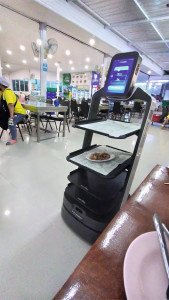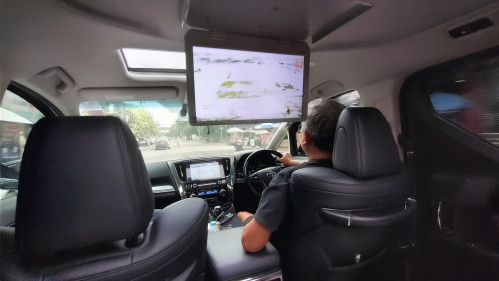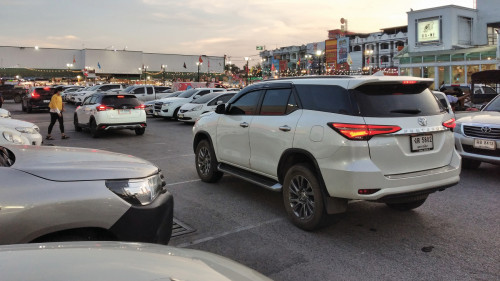Dipl. Ing. Peter Winkel describes in an essay how an electroplating company in Thailand was able to grow during the coronavirus pandemic and the general conditions for coaters there.
Looking back
In the 1980s, I had several opportunities to visit surface technology companies, preferably electroplating plants, in Thailand and report on them in Galvanotechnik magazine. Now, after more than 30 years, I have once again been able to gain an insight into the development of surface technology in Thailand. The global coronavirus pandemic in particular has had consequences for Thailand that have had a significant impact on the economy and therefore also on surface technology. Clever management concepts were decisive for the continued existence of a company. The company management was often even more involved in the decisions than the direct technology. When making decisions on the company side, the social side must also be taken into account and experienced employees must be rewarded accordingly in order to keep them in the company in the post-corona period. The following report shows the example of a company that not only continued to exist but also grew its surface technology business in a clever and courageous way by using the coronavirus pandemic and the disruption to the economy to expand its own workshops. However, these explanations can only be seen as examples of existing possibilities and only provide a subjective perspective that may be helpful for future decisions.
Social situation
The social situation has a considerable influence on both employers and employees. In Germany, every employee is compulsorily integrated into the social network. Social insurance is a matter of course and is borne proportionately by the employer. There is virtually no such social assistance in Thailand. In order not to burden their families, most Thais try to find a job. Remuneration is low due to the large number of people willing to work. In electroplating, for example, daily wages of 350 to 500 baht are paid, which corresponds to around 9.50 or 13.50 euros. For a working time of 8 hours, this means an hourly wage of 1.18 or 1.69 euros. If there is a strike here for a minimum hourly wage of 11.50 or 12.50 euros, then it is understandable that companies are leaving Germany and moving abroad. If you compare the seemingly low prices paid by tourists with Thai wages, the cost of living is considerably higher than here. Despite the low wages, many people are employed in all places. There is no law that forces employers to pay a certain wage for a certain job, nor is there an employment office or job center that provides for the unemployed. In Thailand, securing a livelihood forces people to accept unfamiliar or unpleasant work. There is no organized vocational training in Thailand. What counts is the professional experience of the employees. However, this cannot be proven by official documents such as a journeyman's certificate or master craftsman's certificate. What counts is personal ability and image, which identifies the person concerned in their professional group. Accident prevention and environmental protection also affect the social sector. Significant improvements have become standard in recent decades. Today, employees work under similar conditions to those in Germany. The concept of environmental protection was still new to the Thais around 40 years ago, but even then they began to collect metal-containing sludge separately and to look for energy and water-saving processes, with the exception of dryers and hot baths.
Company strategy
40 years ago, there were companies that had their workshops set up almost entirely by suppliers of electroplating products; they primarily aimed for high turnover. These electroplating shops delivered flawless products, but at high production costs. In the case of the electroplating company we visited, they had already looked around Europe and Japan in the 1980s, bought ready-made formulas and started to develop their own. This made it possible to reduce prices and develop new formulas. In particular, these developments resulted in new bath combinations, in some cases together with customers. As a result, additional customers were gained because they were included. In some cases, special processes were developed that the competition did not have. Cooperation with universities led to the development of new processes that were attractive to customers. Cooperation with them and/or the universities during development meant that orders could not be canceled at short notice. This resulted in a certain degree of business security, which also proved useful during the coronavirus pandemic, and a certain independence from suppliers in Europe or Japan developed as a result of the company's own experience. The in-house developments were not only related to special bath formulas, but also to the plant technology. Early on, the company began to purchase individual parts abroad that it was not yet able to manufacture itself, e.g. trolleys for the machines and, in some cases, the control systems for them. However, the company quickly learned and now not only builds the systems for its own operations, but has outsourced this area and markets its own developments independently of the electroplating operation as an independent engineering office. Thanks to the company strategy of separating the surface technology production operation as a contract electroplating company from the design department as an engineering office, suitable employees could be exchanged within the two companies during the corona crisis and continued to be employed without having to make extensive personnel policy efforts - as was the case with us.
Corona pandemic
The global coronavirus pandemic also led to a decline in business in Thailand. By redeploying suitable staff, it was possible to avoid idle times or redundancies, especially the loss of experienced staff: On a farm in the north-east of the country, additional  serving robots were temporarily needed as a solution to the staffing problem in the post-corona period in the restaurant industry . The staff in question were offered the opportunity to work on the farm for a limited period of time. As earning their own income is essential for survival in Thailand, the people concerned agreed, secured the job, gave the company the experience and also made it possible to work on the farm on schedule. With the remaining team, it was possible to complete the remaining surface engineering jobs at the site on time. A canteen was set up on site for the remaining employees, offering them a selection of different menus at a very moderate price. In addition, the company occasionally buys food, e.g. rice, and distributes it to employees as a bonus.
serving robots were temporarily needed as a solution to the staffing problem in the post-corona period in the restaurant industry . The staff in question were offered the opportunity to work on the farm for a limited period of time. As earning their own income is essential for survival in Thailand, the people concerned agreed, secured the job, gave the company the experience and also made it possible to work on the farm on schedule. With the remaining team, it was possible to complete the remaining surface engineering jobs at the site on time. A canteen was set up on site for the remaining employees, offering them a selection of different menus at a very moderate price. In addition, the company occasionally buys food, e.g. rice, and distributes it to employees as a bonus.
International electroplating exports
Many companies were inadequately prepared for the coronavirus crisis and some had to close. With a certain amount of courage and the necessary willingness to take risks, the electroplating company bought up plots of land that had become vacant due to plant closures to expand its own operations, and the electroplating plant was extended. Today, the company has several times more floor space at its disposal, with electroplating facilities spread over three levels and a wide variety of coating jobs can be processed thanks to the various process options. This has led to customers in the automotive industry in China, Japan and other countries. Corona has contributed to an expansion of the business here because the company had the courage to take advantage of the opportunities that presented themselves, but also because it had adapted to new processes in good time and not just to easy-to-produce mass-produced goods. In the pre-corona era, international contacts were mainly related to the import of hardware in the form of finished or semi-finished products as bath salts for the preparation of electroplating treatment baths. There were electroplating shops that were "managed" in practice by representatives of the supplier industry. The avoidance of new deposits through bath correction in the event of malfunctions or, if necessary, activated carbon cleaning was unknown. Bath management was the responsibility of the trade representative for the bath chemicals. However, the plant technology was also imported. In the meantime, the international exchange of experience has also led to a corresponding import of knowledge in Thailand, so that the companies that have not only established such contacts, but also used them to retrofit their own plants, can now also occasionally export their own developments; in particular, however, the coating quality has become possible at limited costs thanks to the self-monitoring that has been learned. This results in orders from abroad, e.g. for the automotive industry. The costs for occupational safety and above all for environmental protection, which are constantly increasing in Germany, are kept within moderate limits abroad, have less of an impact on prices and lead to such a high gap to the production costs to be incurred in Germany that it is worthwhile for some companies to bear the transportation costs of the goods manufactured in Thailand if they do not immediately switch to the complete manufacture of their end products abroad. However, international contacts are also increasingly leading to the import of foreign industrial products in Thailand. One gets the impression that imports in Thailand are not driven by "fashion trends", but that - perhaps due to limited incomes - people are primarily focused on benefits and their own needs: The corona pandemic has also led to many redundancies in Thailand, especially in the catering industry. After hygiene measures were relaxed and restaurants were full again, there was a fatal shortage of staff. International contacts helped by using serving robots that are still produced in Japan, but are partly equipped with components that were manufactured or electroplated in Thailand. Another example is televisions: as local and long-distance public transport is underdeveloped in Thailand, people are dependent on their own vehicles. Large cars, many pick-ups and 6- to 7-seater vans are often driven. Due to occasional traffic jams and the associated waiting times, but also for longer journeys, many vehicles are equipped with monitors on the dashboard, which are combined with navigation devices; for vans, large fold-out monitors for rear-seat passengers are supplied as possible standard equipment. All of these devices rely on modern electronics, which are increasingly manufactured in Germany and require a considerable amount of electroplating. When it comes to traffic control, old and new technology are combined in a sensible way: an economy that relies on fast delivery requires good traffic flow; blockages caused by bicycle lanes and flower tubs that lead to slow stop-and-go driving impair the rapid delivery of goods to customers and lead to significantly higher fuel consumption and correspondingly higher exhaust emissions. In Thailand, people accept having to wait up to two minutes for the green light at traffic lights for the less busy route. Then the congested traffic is released in a sufficient green phase. For the purpose of regulation, there is sometimes a digital clock next to the actual traffic signal which shows the remaining time until the green/red color change from a distance. The driver can adjust to this traffic light in the same way as with the mechanical pointer traffic lights of the past, but it is not possible to control changing intervals. This technology also requires electroplating for control and corrosion protection. In larger vehicles, large monitors provide entertainment for the rear passengers, while the driver has to make do with a smaller monitor on the dashboard that is combined with the navigation system for space reasons
In larger vehicles, large monitors provide entertainment for the rear passengers, while the driver has to make do with a smaller monitor on the dashboard that is combined with the navigation system for space reasons
Logistics
Another factor for economic efficiency is logistics. Because the railroad network in Thailand is not very well developed, the delivery and collection of goods is mainly carried out by road. Car traffic is very dense and the roads are usually generously developed. Three and four-lane highways are almost the rule. For local traffic, there is often another lane in both directions next to the highways so as not to interfere with through traffic. This ensures a reasonable flow of traffic and reduces exhaust emissions. Many companies maintain their own transport fleet due to the speed of deliveries. As a result, there is heavy traffic everywhere. Environmental protection must be financed by a flourishing economy; if this is choked off, a small country like Thailand in particular cannot afford environmental protection measures at all or only to a modest extent. Densetraffic does not only dominate inner-city streets. But it can be managed sensibly through clever traffic control, which nevertheless keeps exhaust emissions within limits
Densetraffic does not only dominate inner-city streets. But it can be managed sensibly through clever traffic control, which nevertheless keeps exhaust emissions within limits
Conclusion
The example of development in an even less industrially developed country like Thailand shows that even in times of crisis, such as the coronavirus pandemic, economic losses and business closures can be avoided. Skilful, future-oriented action enables the right decisions to be made to expand the business and thus increase sales in the medium term. This includes social aspects and the inclusion of logistics, but also foresight and a certain willingness to take risks. Recognizing new trends in good time, cooperating with research institutes at technical colleges and universities and, if necessary, involving the customer in order to be able to offer modern economic solutions at the right time. In today's globally networked economy, this also includes keeping a close eye on developments abroad and, if necessary, seeking contact with developers or initiating targeted developments in good time. In addition to internal company measures, however, the state also has the task of promoting and maintaining the economy instead of burdening companies with expensive and sometimes questionable environmental regulations. Another burden is the enormous bureaucracy that hinders many a good development. Political interests should not be a burden on the economy.


